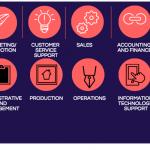As tempting as it can be to sugar coat things and pretend everything’s just swell (especially in the social media obsessed world of filters), there is no point trying to pretend that launching a business is going to be a walk in the park with a couple of puppies. It isn’t. In fact, starting a business is just about the riskiest thing anyone can do aside from stepping into shark-infested waters wearing Lady Gaga’s meat dress. Weirdly enough, the odds of survival are about the same: 50/50.
That’s right. Half of all startups don’t live long enough to see their fourth birthday. Unfortunately, there is no surefire way of making sure you are one of those companies blowing out the candles on your cake five years from now. Instead, what you need is a mix of true grit, relentless determination, business brilliance, the gift of the gab and a whole barrel of luck, and even then you may not make it.
“How come?” We hear you asking. Simple. More than anything else, success needs you to minimize the risks. That’s the real secret to it all. The problem is, it is easier to open the door to risk than most entrepreneurs-slash-freelancers realise, which is why the same mistakes get made over and over again.
To stop you from falling into the same bear pit, we have pulled together a list of the most common mistakes and how you can avoid them.

1. Money Pot For Taxes
This is one of the hardest things for new business owners to get used to, and that’s because most people have gotten used to seeing their taxes come out of their paycheck automatically. You don’t even see it. As an entrepreneur, though, the game has changed and so you need to start being disciplined enough to put money aside yourself. This is where another issue tends to crop up because, at the beginning of your journey, your income and expenses and all of that tends to fluctuate more than a plane in turbulence, so you don‘t really know how much you’re making or how much you owe in taxes, which this article on www.thebalance.com explains. As a golden rule, from the moment you get your very first payment, start putting away at least 25% of your income. If you start doing really well really quickly, then you need to know about tax brackets and how much the government will want to take.
2. Ensure You’re Insured
There are no two ways about it: if you are in business, you need business insurance. Period. Fact. The end. Of course, you probably know this already. Unfortunately, the reason it catches so many people out is they don’t place enough priority on it or they don’t know what sort of insurance they need. If that’s the case with you, then speak to someone like www.Equifyllc.com and have their risk management team review your business and highlight any vulnerabilities in your company. It could be that you are self-employed, in which case you may be required to have health insurance whereas, if you’re handling client data, you will need much more specific types of insurance. For example, you might need omission insurance if you work as a consultant or you might be required to have $1 million of liability insurance. It all depends on what you do and how you do it, so have a professional come and plug the holes.
3. Choosing An Entity
Of all the decisions you’ll be required to make as a startup company, none is going to be more important than deciding what sort of entity you operate as. It is just one of those decisions that will affect you now and in the future, and in more ways than you may realise. Even if it’s just you working from your kitchen table right now, picking the right business entity is soooo crucial. Why? Because this will determine how much your company pays in tax, the amount of paperwork you have to go through, how much you are exposed to external claims, how easy or hard you find it to raise funds from investors, the control you have over the management of your operation and, last but not least, the operational costs you have to shoulder. Mmm hmmm, it is all influenced by the entity decision. Of course, how you decide what suits your needs best still needs answering. Our advice: speak to a tax advisor or certified professional and have them look over your current operations and future ambitions. That’s the best thing you can do.
4. The Matter Of Debt
If there is one thing you’ll quickly realise, it’s how many business expenses you’ll have. The important thing is to not let these get out of hand and transform into mounting piles of debt, which can happen easier than you might realise. As such, you need to know the difference between good debt and bad, and then learn how to control it. It’s all about knowing what the debt-to-equity ratio is in your industry. Anyway, to help you control your debt, there are a few tips you should write onto post-it notes and stick above your desk, and the first of these goes like this: don’t spend on credit cards unless you have a plan to pay this spending off at the end of each month. Another great way of minimising your debt risk is to build up your cash reserve. Sure, this can take a chunk of months and fiscal quarters to happen, but it is so worth having a pot that can help you cover expenses and stay debt-free. Not just that, but you’ll also be able to jump on opportunities and enjoy the good-times too. Oh, and lastly, don’t forget to pay yourself. Now, you may be thinking, “how could I possibly forget to do this?” But you’ll be surprised how tempting it is to just pump the money back into your business, which is logical. However, if you don’t pay yourself something along the way then you might find your personal finances getting harmed and who knows what that could lead on to.











